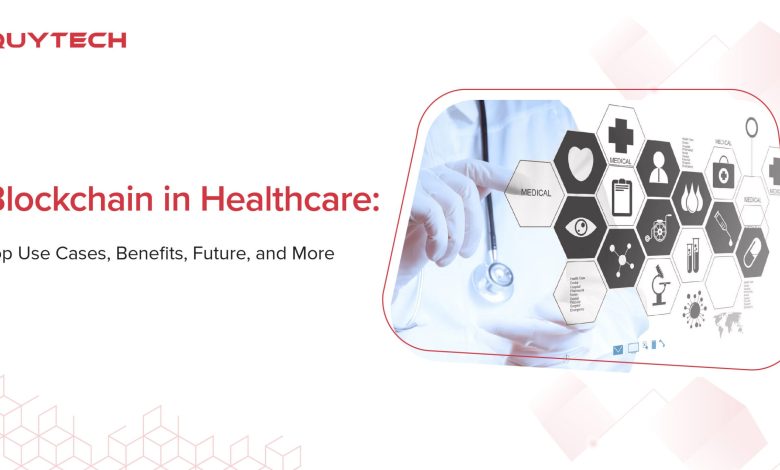Blockchain for Healthcare: Use Cases and Benefits

- Introduction to Blockchain Technology
- Benefits of Implementing Blockchain in Healthcare
- Use Cases of Blockchain in Healthcare
- Enhancing Data Security with Blockchain
- Improving Interoperability in Healthcare Systems
- Challenges and Future Outlook of Blockchain in Healthcare
Introduction to Blockchain Technology
Blockchain technology is a decentralized, distributed ledger system that securely records transactions across a network of computers. Each transaction is stored in a “block” that is linked to the previous block, forming a chain of blocks – hence the name “blockchain.” This technology ensures transparency, security, and immutability of data, making it an ideal solution for industries like healthcare that require secure and efficient data management.
In the healthcare sector, blockchain technology has the potential to revolutionize the way patient data is stored and shared. By using blockchain, healthcare providers can securely store patient records, ensuring that sensitive information is protected from unauthorized access. Additionally, blockchain can streamline processes such as insurance claims processing, drug traceability, and clinical trials management, leading to improved efficiency and reduced costs for healthcare organizations.
One of the key benefits of blockchain technology in healthcare is its ability to provide a single source of truth for patient data. This means that all stakeholders, including patients, doctors, insurers, and researchers, can access and update the same set of data in real-time, reducing the risk of errors and discrepancies. Furthermore, blockchain can enhance data security by encrypting information and providing a tamper-proof audit trail of all transactions, ensuring the integrity of the data.
Overall, blockchain technology holds great promise for transforming the healthcare industry by improving data security, interoperability, and efficiency. As more healthcare organizations adopt blockchain solutions, patients can expect to see better outcomes, reduced costs, and enhanced privacy protection in their healthcare experiences.
Benefits of Implementing Blockchain in Healthcare
Implementing blockchain technology in healthcare offers a wide range of benefits that can revolutionize the industry. Some of the key advantages include:
- Enhanced security: Blockchain provides a secure and tamper-proof way of storing and sharing patient data, reducing the risk of data breaches and unauthorized access.
- Improved interoperability: By using a decentralized system, blockchain enables seamless sharing of patient information across different healthcare providers, leading to better coordination of care.
- Increased transparency: The transparent nature of blockchain allows patients to have more control over their own health data and understand how it is being used.
- Streamlined processes: Smart contracts can automate various administrative tasks, such as insurance claims processing and billing, saving time and reducing errors.
- Enhanced data integrity: The immutability of blockchain ensures that medical records are accurate and up-to-date, reducing the risk of errors and improving patient outcomes.
Overall, implementing blockchain in healthcare can lead to a more efficient, secure, and patient-centered system that benefits both providers and patients alike.
Use Cases of Blockchain in Healthcare
Blockchain technology has numerous use cases in the healthcare industry, offering innovative solutions to long-standing challenges. Some of the key applications of blockchain in healthcare include:
- Medical Records Management: Blockchain can securely store and manage patient medical records, ensuring data integrity and privacy. Patients can have control over who accesses their information, reducing the risk of data breaches.
- Drug Traceability: Blockchain can track the entire supply chain of pharmaceuticals, from manufacturing to distribution, to verify the authenticity of drugs and prevent counterfeit products from entering the market.
- Clinical Trials: Blockchain can streamline the process of conducting clinical trials by securely recording and sharing data among researchers, sponsors, and regulatory authorities. This can lead to faster approvals and improved transparency.
- Telemedicine: Blockchain can facilitate secure and transparent telemedicine consultations by recording patient-doctor interactions and ensuring the confidentiality of sensitive information exchanged during virtual visits.
- Healthcare Payments: Blockchain can simplify healthcare payments by enabling secure and instant transactions between patients, providers, and insurers, reducing administrative costs and improving billing accuracy.
Overall, blockchain technology has the potential to revolutionize the healthcare industry by enhancing data security, interoperability, and efficiency across various healthcare processes. By leveraging blockchain solutions, healthcare organizations can improve patient outcomes, reduce costs, and drive innovation in the delivery of care.
Enhancing Data Security with Blockchain
Enhancing data security in the healthcare industry is crucial to protect sensitive patient information from cyber threats and unauthorized access. Blockchain technology offers a secure and transparent way to store and manage data, making it an ideal solution for improving data security in healthcare.
By utilizing blockchain, healthcare organizations can create a decentralized database that is resistant to tampering and hacking. Each block in the chain contains a timestamp and a link to the previous block, creating a secure and immutable record of all transactions. This ensures that patient data remains confidential and cannot be altered without detection.
Furthermore, blockchain technology uses encryption and consensus algorithms to verify the authenticity of data, reducing the risk of data breaches and fraud. This added layer of security helps healthcare providers comply with regulations such as HIPAA and GDPR, which require strict data protection measures.
In addition to enhancing data security, blockchain can also improve data interoperability and streamline processes within the healthcare ecosystem. By enabling secure data sharing between different healthcare providers and systems, blockchain can facilitate better coordination of care and improve patient outcomes.
Improving Interoperability in Healthcare Systems
Improving interoperability in healthcare systems is a crucial aspect of enhancing patient care and streamlining operations. By utilizing blockchain technology, healthcare organizations can overcome the challenges associated with siloed data and incompatible systems. Blockchain allows for secure and transparent sharing of data across different platforms, ensuring that patient information is accurate and up-to-date.
One of the key benefits of blockchain in healthcare is its ability to create a single source of truth for patient data. This eliminates the need for manual reconciliation of records and reduces the risk of errors. Additionally, blockchain can help improve data integrity and security by providing a tamper-proof record of all transactions.
With blockchain, healthcare providers can access real-time information about a patient’s medical history, medications, and treatments. This can lead to more informed decision-making and better coordination of care. By standardizing data formats and protocols, blockchain promotes seamless communication between different systems and stakeholders.
Overall, the implementation of blockchain technology in healthcare systems can lead to improved interoperability, data accuracy, and patient outcomes. It has the potential to revolutionize the way healthcare data is managed and shared, ultimately benefiting both patients and providers alike.
Challenges and Future Outlook of Blockchain in Healthcare
One of the main challenges facing the implementation of blockchain in healthcare is the issue of data privacy and security. As patient information is highly sensitive, ensuring that it is protected from unauthorized access is crucial. Blockchain technology can help address this challenge by providing a secure and immutable way to store and share data.
Another challenge is the interoperability of different healthcare systems. With the use of blockchain, data can be shared seamlessly between different providers and systems, leading to more efficient and coordinated care for patients. This can help reduce errors and improve patient outcomes.
Looking towards the future, blockchain has the potential to revolutionize the healthcare industry. By enabling secure and transparent transactions, it can streamline processes such as billing and claims processing. Additionally, the use of smart contracts can automate various aspects of healthcare administration, saving time and resources.
Overall, the future outlook for blockchain in healthcare is promising. As more organizations adopt this technology, we can expect to see improved data security, increased interoperability, and greater efficiency in healthcare delivery. By overcoming the current challenges and embracing the potential of blockchain, the healthcare industry can truly transform for the better.



